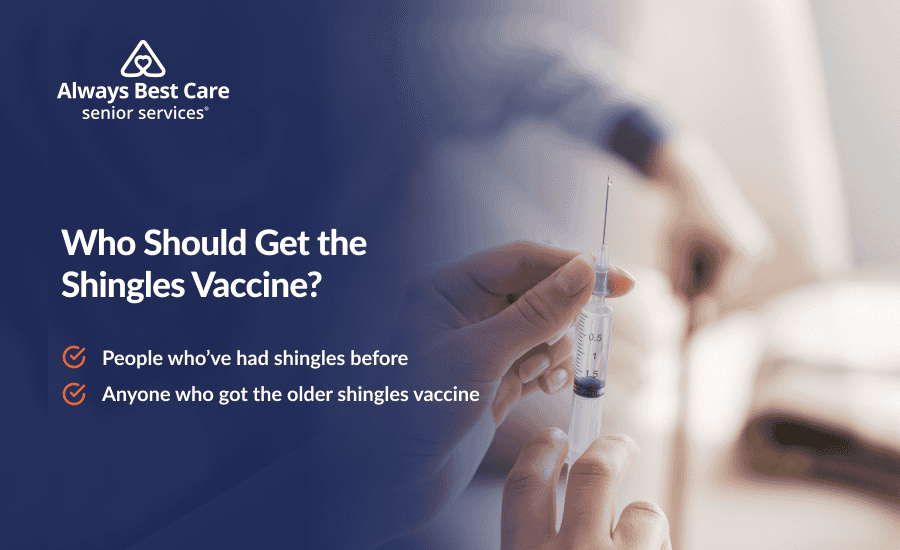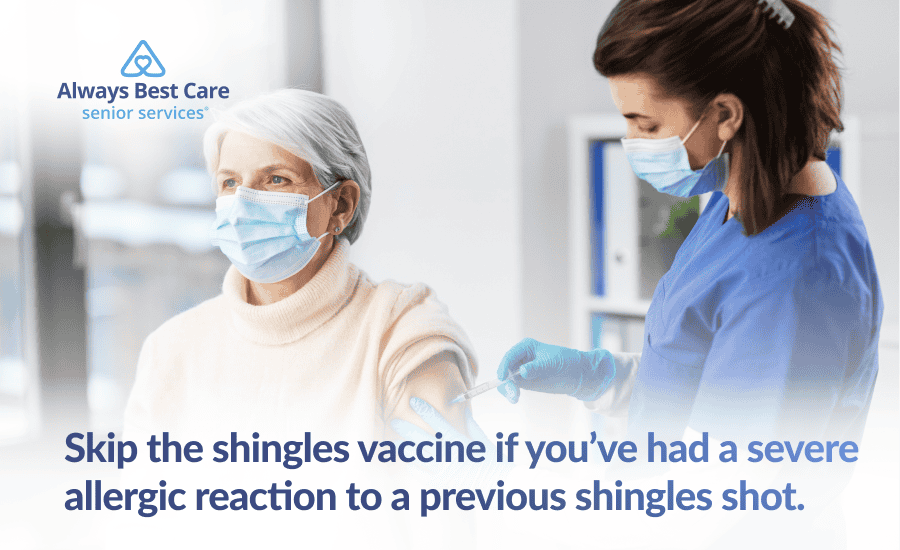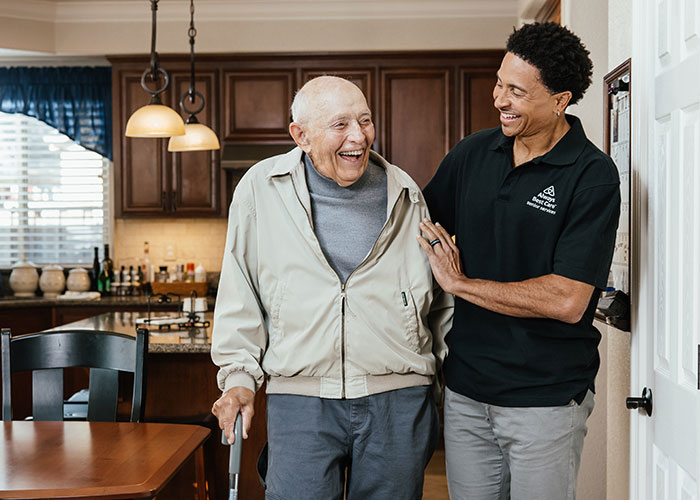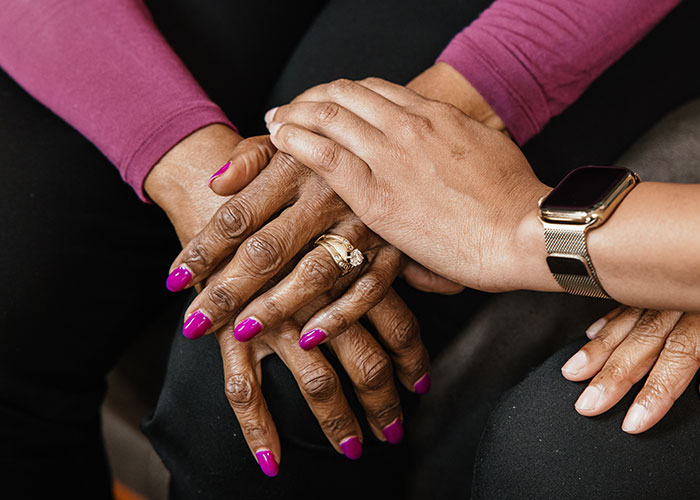Shingles Vaccine for Seniors [How To Ease Discomfort & FAQs]
![Shingles Vaccine for Seniors [How To Ease Discomfort & FAQs]](https://cdn.alwaysbestcare.com/wp-content/uploads/2025/10/shingles-vaccine-for-seniors-hero-image.png)
Table of Contents
Shingles Vaccine for Seniors Explained: Key Takeaways
- Getting the shingles vaccine is the best way to protect yourself from shingles and the nerve pain it can cause later on
- Individuals can get this vaccine in two doses
- This vaccine is over 90% effective at preventing both shingles and long-term nerve pain in adults over 50 with healthy immune systems
Have you ever seen a noticed a strange rash near your loved one’s eye and thought it was from a fall? It might not be an injury at all; it could be shingles.
Shingles is more common than you might think. In fact, the CDC says 1 in 3 people in the U.S. will get shingles at some point in their lives.
To help you navigate the shingles vaccine for older adults, this guide will:
- Explain the CDC’s recommended vaccination schedule for adults aged 50 and older
- Provide answers as to how long its protection lasts
- Clarify who should and shouldn’t get this vaccine
- Share how Always Best Care can support your loved one at home, especially if they experience post-vaccine discomfort or shingles-related symptoms
- Address the most important questions regarding shingles.
Understanding the Shingles Vaccine for Seniors
As we get older, our immune system weakens, increasing the risk of shingles, a painful rash caused by the chickenpox virus.
For many seniors, this condition can lead to serious complications like postherpetic neuralgia, which causes lasting nerve pain even after the rash is gone.
The shingles vaccine, called SHINGRIX, can help prevent shingles.
It’s over 90% effective at protecting adults 50 and older with healthy immune systems from both the rash and the long-term nerve pain it can cause.
Shingles Vaccine: Recommended Schedule for Adults Age 50+ and Older
The shingles vaccine is given in two doses, two to six months apart.
How Long Does the Shingles Vaccine Last?
The shingles vaccine provides strong protection for at least seven years, and possibly longer. Right now, there’s no booster needed after the two-dose series.
Who Should Get the Shingles Vaccine?
You should still get the vaccine if:
- You’ve had shingles before: Having it once doesn’t mean you can’t get it again. Just wait until the rash has fully cleared before getting your first dose.
- You received the older shingles vaccine (ZOSTAVAX®): If you received ZOSTAVAX® in the past, you should still get the newer SHINGRIX vaccine for stronger, longer-lasting protection.
Ask your healthcare provider if you’re unsure whether you’ve had chickenpox. They might recommend a blood test to check for antibodies and confirm past exposure – infection.

Who Shouldn’t Get the Shingles Vaccine?
This vaccine is safe for most people, but there are a few circumstances where it might not be the right choice.
Skip if:
- You’ve had a severe allergic reaction to a previous dose of the shingles vaccine
- A blood test shows you’ve never had chickenpox. In that case, your provider might recommend the chickenpox vaccine instead.

Possible Side Effects of the Shingles Vaccine
Like many vaccines, the shingles shot can cause some mild, temporary side effects. These are signs your body is building protection and they usually go away in a few days.
Nobody wants to feel worse after a shot, so here’s what to expect:
- Headache
- Nausea
- Mild fever
- Feeling tired or run down
- Upset stomach or abdominal discomfort
- Soreness, redness, or swelling where the shot was given
How Do You Know if Your Elderly Loved One Has Shingles?
Even though shingles usually show up in a small patch on one side, they can still leave your loved one feeling drained and uncomfortable.
Your elderly loved one might notice:
- Itching around the affected area
- Pain, burning, or tingling in one area
- Skin that’s very sensitive to touch
- A red rash that appears a few days after the pain starts
- Fluid-filled blisters that may break open and scab over
Some people also feel unwell in other ways, including:
- Fever
- Headache
- Sensitivity to light
- Fatigue or low energy
If your elderly loved one is experiencing these symptoms, know that you’re not alone and support is available.
Early treatment can help ease discomfort and prevent complications, so don’t hesitate to reach out to a healthcare provider.
Where Can Shingles Show Up on the Body?
Shingles can develop in various parts of the body, though it usually shows up as a stripe or cluster of blisters on one side.
This rash can be painful and uncomfortable, especially in sensitive areas.
Let’s take a look at the areas where shingles is most likely to appear:
- Face or head: Shingles might affect the forehead, scalp, or area around the eyes. If the rash spreads to the face, seek medical attention immediately, as it can result in serious complications affecting the eyes.
- Torso or chest: It often shows up as a stripe-like rash across the chest or abdomen.
- Arms and legs: The rash can extend to the arms, legs, or even the groin, depending on which nerves are affected.
- Genitals: Though less common, shingles can also affect the genital area, which might be especially uncomfortable.
How To Ease Shingles Discomfort in Older Adults
If your loved one is dealing with shingles, simple in-home care can go a long way in easing the discomfort.
1. Call Your Loved One’s Doctor as Soon as You Notice a Rash
Starting antiviral medication within the first three days of the shingles rash appearing can significantly reduce nerve pain, shorten the duration of the outbreak, and lower the risk of complications.
2. Ask About Antivirals
Your loved one’s doctor can prescribe the most appropriate antiviral medication, such as acyclovir, valacyclovir, or famciclovir, depending on their age, health history, and how soon the symptoms started.
If your loved one is immunocompromised or managing other chronic conditions, their doctor will carefully consider the risks and benefits to select the safest treatment.
3. Ease the Pain With Over-the-Counter Options
With the right support, it’s possible to soothe symptoms at home. Your senior loved one can try:
- Acetaminophen (Tylenol) for overall pain relief
- Ibuprofen (Advil or Motrin) to help with inflammation and soreness
4. Keep the Rash Clean and Dry
Keeping your loved one’s rash clean is one of the best ways to prevent infection and help their skin heal, especially if they’re older or have a weakened immune system.
Gently wash the area once a day with mild soap and lukewarm water. Skip harsh soaps or scrubbing, as these can irritate the skin.
After bathing, pat the rash dry with a clean, fresh towel to avoid spreading the virus to other areas of their body or to others in your household.
5. Soothe the Skin
Ensure your loved one wears loose, breathable fabrics like cotton to prevent clothing from rubbing against the rash.
Soft, airy materials allow your skin to stay cool and comfortable, while tight or synthetic fabrics can trap heat and make irritation worse.
To ease discomfort, apply a cool, damp cloth to the rash for 10–15 minutes a few times a day.
6. Cover the Rash if Needed
Shingles can spread to people who haven’t had chickenpox or the chickenpox vaccine, especially through direct contact with open blisters.
If the area isn’t already covered by clothing, use a sterile, non-stick bandage to gently shield it and prevent irritation or scratching.
Change the bandage daily, or sooner if it gets damp or dirty, to keep the skin clean and dry.
7. Reach Out if the Pain Becomes Too Much
Shingles is often described as a burning sensation, tingling, or persistent itching.
If over-the-counter medications aren’t helping, your elderly loved one’s doctor can recommend something stronger, like nerve pain relief, anti-inflammatory prescriptions, or soothing topical creams.
Make Recovery Easier for Your Loved One With Always Best Care Senior Services
At Always Best Care, we know shingles can be uncomfortable and exhausting for seniors.
We don’t administer the vaccine ourselves, but we recognize how important it is for preventing shingles and the painful complications it can cause.
If your loved one is recovering from shingles, our compassionate caregivers can provide the support they need to rest and heal comfortably at home. We can help with:
- Meal preparation to ensure your loved one stays nourished and hydrated
- Medication reminders to help them stay on schedule with antivirals or pain relief
- Light housekeeping and personal care (think toenail cutting services) to keep your loved one clean, comfortable, and at ease at home
- Errands and transportation services to help seniors get to appointments, pick up prescriptions, or enjoy a quick trip to the grocery store
- Companionship to ease loneliness and help them feel cared for and supported
If your loved one has recently been hospitalized due to severe complications, our hospital-to-home services can make their recovery smoother and safer.
We’re here to make each day a little easier, helping your loved one stay comfortable, supported, and surrounded by care.
Shingles Vaccine: FAQs
How often should you get the shingles vaccine?
Most adults only need to get the shingles shot once in their life.
Can you get shingles after the chickenpox vaccine?
There’s a small chance, but it’s rare. Most people who develop shingles had chickenpox, not the chickenpox vaccine.
The risk is lower if you were vaccinated for chickenpox instead of having the actual illness.
Am I contagious after I get the shingles shot?
No. SHINGRIX, the current shingles vaccine, is not contagious. It doesn’t contain a live virus, so you can’t pass anything on to others.
Can you still get shingles after the vaccine?
Yes, but it’s rare. The vaccine is over 90% effective, and if you do get shingles, it’s usually milder and shorter.
Can you get the flu shot right after the shingles vaccine?
Yes, it’s safe to get the flu shot right after your shingles vaccine. In fact, you can even get both at the same appointment if it’s more convenient for you.
Want to learn more about other important vaccines for older adults? Check out these vaccine guides:





